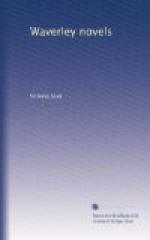Waverley could not avoid observing that Davie laid something like a satirical emphasis on these lines. He therefore approached, and endeavoured, by sundry queries, to elicit from him what the innuendo might mean; but Davie had no mind to explain, and had wit enough to make his folly cloak his knavery. Edward could collect nothing from him, excepting that the Laird of Balmawhapple had gone home yesterday morning ‘wi’ his boots fu’ o’ bluid.’ In the garden, however, he met the old butler, who no longer attempted to conceal that, having been bred in the nursery line with Sumack and Co. of Newcastle, he sometimes wrought a turn in the flower-borders to oblige the Laird and Miss Rose. By a series of queries, Edward at length discovered, with a painful feeling of surprise and shame, that Balmawhapple’s submission and apology had been the consequence of a rencontre with the Baron before his guest had quitted his pillow, in which the younger combatant had been disarmed and wounded in the sword arm.
Greatly mortified at this information, Edward sought out his friendly host, and anxiously expostulated with him upon the injustice he had done him in anticipating his meeting with Mr. Falconer, a circumstance which, considering his youth and the profession of arms which he had just adopted, was capable of being represented much to his prejudice. The Baron justified himself at greater length than I choose to repeat. He urged that the quarrel was common to them, and that Balmawhapple could not, by the code of honour, evite giving satisfaction to both, which he had done in his case by an honourable meeting, and in that of Edward by such a palinode as rendered the use of the sword unnecessary, and which, being made and accepted, must necessarily sopite the whole affair.
With this excuse, or explanation, Waverley was silenced, if not satisfied; but he could not help testifying some displeasure against the Blessed Bear, which had given rise to the quarrel, nor refrain from hinting that the sanctified epithet was hardly appropriate. The Baron observed, he could not deny that ’the Bear, though allowed by heralds as a most honourable ordinary, had, nevertheless, somewhat fierce, churlish, and morose in his disposition (as might be read in Archibald Simson, pastor of Dalkeith’s ‘Hieroglyphica Animalium’) and had thus been the type of many quarrels and dissensions which had occurred in the house of Bradwardine; of which,’ he continued, ’I might commemorate mine own unfortunate dissension with my third cousin by the mother’s side, Sir Hew Halbert, who was so unthinking as to deride my family name, as if it had been quasi bear-warden; a most uncivil jest, since it not only insinuated that the founder of our house occupied such a mean situation as to be a custodier of wild beasts, a charge which, ye must have observed, is only entrusted to the very basest plebeians; but, moreover, seemed to infer that our coat-armour had not been achieved by




